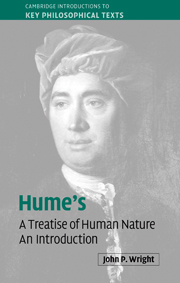Book contents
- Frontmatter
- Contents
- Preface
- Acknowledgments
- List of abbreviations
- 1 The author and the book
- 2 First principles
- 3 Causation
- 4 Skepticism
- 5 Determinism
- 6 Passions, sympathy, and other minds
- 7 Motivation: reason and calm passions
- 8 Moral sense, reason, and moral skepticism
- 9 The foundations of morals
- Bibliography and further reading
- Index
2 - First principles
Published online by Cambridge University Press: 05 June 2012
- Frontmatter
- Contents
- Preface
- Acknowledgments
- List of abbreviations
- 1 The author and the book
- 2 First principles
- 3 Causation
- 4 Skepticism
- 5 Determinism
- 6 Passions, sympathy, and other minds
- 7 Motivation: reason and calm passions
- 8 Moral sense, reason, and moral skepticism
- 9 The foundations of morals
- Bibliography and further reading
- Index
Summary
The scope of the book published by David Hume in 1739–40 is quite mind-boggling. He says in the Introduction to the Treatise that he is proposing “a compleat system of the sciences, built on a foundation almost entirely new” (TI 5–6: xv–xvi). This foundation consists in “the principles of human nature” which he sets out to explain. Not only does Hume propose to provide a unity to the natural and social sciences including “Mathematics, Natural Philosophy … Natural Religion … Logic, Morals, Criticism and Politics,” but he also proposes to do so by establishing an entirely new science which will be the basis for this unity. It is no small wonder that the first reviewers of the Treatise called its author pretentious, and that he himself subsequently came to believe that his first publication was overly ambitious.
In order to get some idea of Hume's project we need to understand the nature of this foundational science which he is inventing – what in the Introduction he calls the “the science of man” (TI 7: xvi) or the science of human nature. The principles of human nature are also called “principles of the soul” – the psyche (TI 9: xvii). It is a science of what we today would call psychology, although that term did not come into general use until long after Hume wrote. In the body of the Treatise he discusses different powers of the soul or mind, such as the senses, reason, imagination, and the passions.
- Type
- Chapter
- Information
- Hume's 'A Treatise of Human Nature'An Introduction, pp. 40 - 78Publisher: Cambridge University PressPrint publication year: 2009

